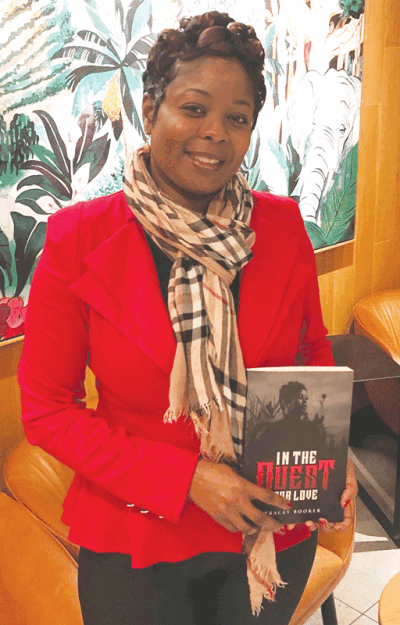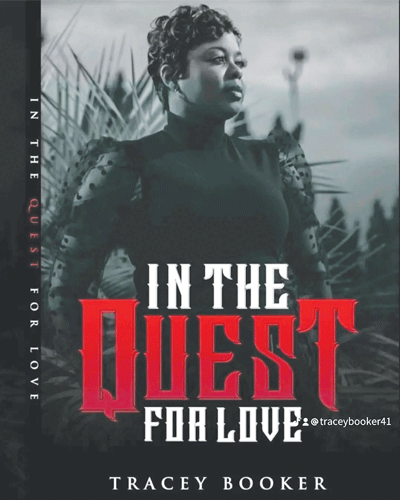
Grosse Pointe Farms resident Tracey Booker holds a copy of her book, “In the Quest for Love,” which explores the issue of domestic violence.
Photo by K. Michelle Moran
GROSSE POINTE FARMS — From her secret hiding spot inside a cabinet, a young Tracey Booker watched in horror as her stepfather smashed a frying pan against her mother’s head.
It’s one of the searing memories she recounts in her first book, “In the Quest for Love.” Written in third person, the book recounts domestic violence experienced by Booker, her mother and some of Booker’s friends. Booker — who eventually broke free of this cycle — penned the tome as part of her healing process, and hopes it will inspire others as well. “In the Quest for Love” was published in March 2023.
“My goal is to heal people,” said Booker, 45, who lives in Grosse Pointe Farms with her son. “People need to talk about it. It’s a part of my healing as well.”
October is Domestic Violence Awareness Month. State leaders say as many as one in three Michigan families experience domestic violence.
Booker, who grew up on Detroit’s east side, said the trauma of witnessing her mother’s abuse led her to seek love from men who ended up abusing her as well.
“He was always nice to us,” Booker said of her stepfather’s treatment of her and her siblings. “It was confusing to have love for him and my mom in one setting. And because she kept taking him back, I didn’t know how to act.”
Through journaling, massage and reiki therapy, Booker began to see that her relationships weren’t healthy. She started going to church again and found strength in her faith and reading the Bible. “In the Quest for Love” includes relevant Bible quotes in each chapter.
“I had to learn to love myself over time and stand up to a bully,” said Booker, who has become an ordained minister and hopes to offer counseling to other victims. “I started working on self. I realized, it’s a me problem. … I can’t fix him — I can only fix me.”
Booker said she’s “not pushing religion” on anyone.
“What worked for me could work for other women,” Booker said. “I’m not forcing anything down anybody’s throat. I am saying, ‘Here’s a road map.’ You can tweak it any way you want.”
After 25 years in the mortgage industry, Booker now manages a time-share company and also works in the catering industry. She’ll complete her bachelor’s degree in business and leadership in May.
“I’m finally doing me,” Booker said. “I want my son to see (this).”
She’s proud of her 23-year-old daughter, who’s already a college graduate. She included her children in the dedication for “In the Quest for Love.”
Booker, who previously lived in a different city, doesn’t have much trust in the criminal justice system, which she said failed her and her mother.
“The court system is not going to help you,” Booker said. “We are living in a time when you don’t get help unless you’re on your deathbed.”
However, public safety officials in the Grosse Pointes say that if someone is experiencing domestic violence, they want to help.
The Grosse Pointe Shores Public Safety Department gives victims of domestic violence a packet with information — including phone numbers for shelters and listings of other resources.
“Every victim of domestic violence gets the priority from the public safety department to make that person safe and feel safe,” Shores Public Safety Director Kenneth Werenski said by email. “Any medical attention will be provided, or transportation provided to seek further medical attention. And as always that feeling of safety comes with either removing the victim or the perpetrator from the home as the law states.”
The National Domestic Violence hotline — (800) 799-7233 — can connect victims with domestic violence shelters in their area and other resources.
Grosse Pointe Farms Deputy Public Safety Director Andrew Rogers said his department has seen grandparents abused by grandchildren, as well as violence by partners in a relationship. He said the safety of the victim is paramount.
“From a police standpoint, we would like people to remove themselves and call (us) from a safe place, if they can,” Rogers said.
He said there are about 20 shelters within a 25-mile radius of the Farms, and most of them will accept children, so families don’t have to be separated. Rogers said some shelters accept male victims, so everyone has somewhere to go.
When someone files a domestic violence complaint, Rogers said, it’s the Public Safety Department — not the victim — who’s listed as the complainant. He said that “takes the pressure off of the victim” if the victim is urged later by the assailant to drop the charges.
Rogers wants victims to know that they aren’t alone, and assistance is available.
“There’s always a way out for victims,” Rogers said. “Don’t let the embarrassment or stigma stop you (from leaving), because things can escalate quickly and you can wind up dead.”
Booker said one of her abusers was a man who showered her with expensive gifts and offered her a lavish lifestyle. She said victims shouldn’t let those financial trappings keep them in a bad relationship.
“When I said I was leaving, my girlfriends said I was crazy,” Booker said.
But by leaving, “I’m saying, ‘I love me more,’” Booker continued. “I can’t be bought. I’m not staying just because of what I have.”
State officials are making efforts to protect victims. Earlier this month, the Michigan Senate passed three bills — sponsored by State Sens. Stephanie Chang, D-Detroit, and Sue Shink, D-Northfield Township — that amend the state’s penal code and ban those convicted of misdemeanor domestic violence crimes from using, buying, carrying or having a firearm in Michigan for eight years.
“The issue of domestic violence touches Michiganders in all corners of our state,” Shink said in a press release. “Throughout the committee process, we’ve heard heartbreaking testimonies from residents who have survived abuse, as well as from parents and friends whose loved one was shot and killed by an intimate partner. The research is clear: Firearms and domestic violence are a volatile combination that ends all too often in the senseless loss of life. This legislation serves as an important step to disarm abusers and protect survivors from further pain.”
Booker said she has since come to recognize that her abusers, and her stepfather, all suffered from substance abuse, mental illness or other underlying conditions or trauma. Her second book, “Illusions of Loyalty” — which was slated to be published around the end of October — will explore some of the root causes of domestic violence. Booker said she plans to write a series of books on this topic, to get conversations started and help others who’ve been in her shoes know what to look for and what they can do to get out and heal themselves.
Some people in her family — such as her younger siblings, who didn’t witness the abuse against her mother because they were too young at the time — don’t have the same memories about their father and aren’t comfortable with Booker’s decision to write about what she witnessed growing up, as well as what she experienced in her own relationships as a teen and an adult. She isn’t letting their objections stop her.
“I’m just going to keep telling the story,” Booker said. “I don’t want to hide from this anymore.”
Booker’s books are available from the online bookstores of Amazon and Barnes & Noble, as well as her website, agapeink.org.
 Publication select ▼
Publication select ▼




















